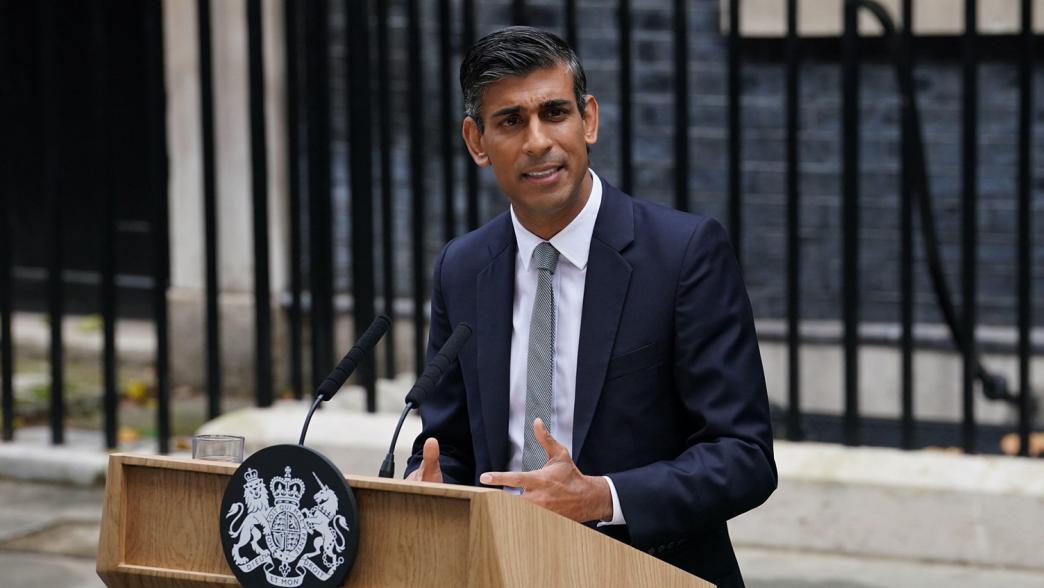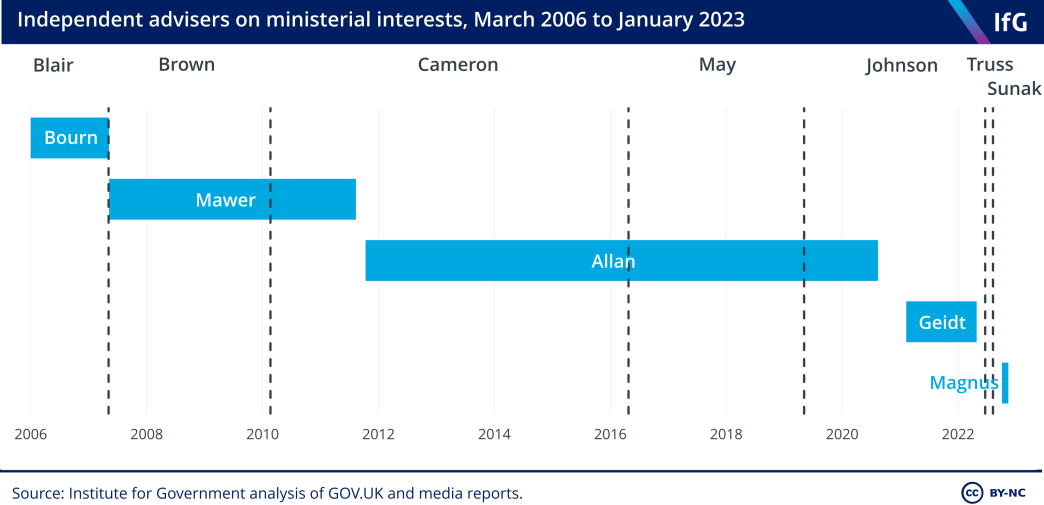Rishi Sunak’s standards problems have not gone away
The PM ended 2022 by appointing a new independent adviser, but that does not mean all the issues around ethical standards have been solved.

The prime minister ended 2022 by appointing a new independent adviser on ministerial interests, but that does not mean all the issues around ethical standards in government have been solved, says Tim Durrant
In one of his final acts before the Christmas holiday, the prime minister appointed Sir Laurie Magnus, chairman of Historic England, as his new independent adviser on ministerial interests. 4 Downing Street, Sir Laurie Magnus appointed as the Prime Minister’s Independent Adviser on Ministers’ Interests, press release, 22 December 2022, www.gov.uk/government/news/sir-laurie-magnus-appointed-as-the-prime-ministers-independent-adviser-on-ministers-interests The post had been vacant since Lord Geidt resigned as Boris Johnson’s independent adviser in June 2022. But while it is good that Rishi Sunak has finally filled the vacancy (Liz Truss had been more lukewarm on the idea during her short premiership), his decision not to reform the role was a missed opportunity.
The prime minister should have strengthened oversight of ethics in government
Sunak should have gone much further in reforming the ministerial code, as well as the role of the independent adviser.
Sir Laurie will carry out the role under the same terms of reference as Lord Geidt, meaning he still requires the prime minister’s permission (which will “normally” be given) to initiate any investigation into potential misconduct by ministers. He also does not have any say over when the findings of his investigations will be published – he can simply “require” that they are published “in a timely manner.” This means that when calls are made for him to investigate the most sensitive allegations, he may well be hamstrung by the prime minister’s political considerations. Sunak revealed his lack of ambition for ensuring high ministerial standards by declining to enhance the powers of the role, as did Sir Laurie by accepting the status quo.
At the same time as appointing Sir Laurie, Sunak issued a new version of the ministerial code, which sets out the standards to which he expects his ministers to adhere. While the updated code is largely the same as the previous version, Sunak’s foreword did reinsert an explicit reference to the Seven Principles of Conduct in Public Life, something Johnson had removed. The main other substantive changes allow greater use of government cars by ministers, provide for better paternity leave arrangements and clarify the rules by which ministers must abide when they leave office. The latter two changes are welcome but fall short of the reforms required.
There is no shortage of ideas for how Sunak can improve standards in government
The failings of Johnson and his team revealed that the structures in the UK for upholding ethics in government are no longer working. Many recommendations have been made, including by the Institute, for how to repair some of the damage.
Key among these is giving the independent adviser the full power to initiate investigations into allegations of misconduct (and to publicly explain when they decide not to do so). They should also be able to publish the findings themselves (after sharing them with the prime minister and those who feature in the report, of course). And they should be able to make recommendations to the prime minister about whether the code has been broken.
The ministerial code should also be reformed, with a clearer distinction between descriptions of how government works and standards to which ministers are expected to adhere. Johnson’s introduction of a range of sanctions for different breaches of the code was an important step forward, but Sunak should go further by putting the code on a proper legal footing, which would give it the same status as the codes which apply to civil servants and special advisers.
None of this would impair the prime minister’s ability to choose who serves in government, but it would create distance between No.10 and investigations into ministers and help rebuild trust in government and politicians. Many of these recommendations were made in a report from the independent Committee on Standards in Public Life in November 2021 – to which the government has still not responded. When Sunak became prime minister he declared his commitment to lead a government of high standards. It is disappointing that he has so far ignored the CSPL’s recommendations.
2023 will not be a straightforward year for standards
Sunak and Sir Laurie are not inheriting a blank slate on ministerial standards. Sir Laurie’s first annual report, to be published in May, will need to provide a conclusion to the investigation into allegations by Nus Ghani MP that she was the victim of Islamophobic discrimination by another minister. And Sunak’s deputy prime minister, Dominic Raab, is being investigated separately (at his own request) after several allegations of bullying. Meanwhile, the parliamentary investigation into whether Boris Johnson knowingly misled the Commons over Downing Street parties will begin hearing evidence, which is sure to make for difficult viewing for the former prime minister and the ministers with whom he governed.
In this difficult context, Sunak had an opportunity to show he meant what he said in Downing Street about leading a government of “integrity, accountability and professionalism”. Appointing a new adviser was an essential step, but the gap between Sunak’s words and actions remains considerable and he has much to do to restore trust in government. Boris Johnson’s premiership exposed serious flaws in the apparatus designed to uphold ministerial standards. Rishi Sunak’s repair-job is falling short of fixing the problem.

- Topic
- Ministers
- Keywords
- Ethical standards Cabinet
- Administration
- Sunak government
- Public figures
- Rishi Sunak
- Publisher
- Institute for Government